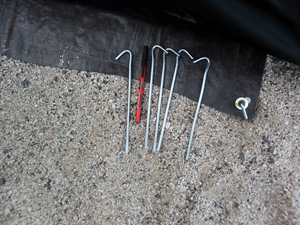
|
Many tents today come with thin, wire-like stakes. Those are fine in some situations, but wonít hold in many of the circumstances four wheelers face.
When traveling by car, weight isnít as much a factor as it is for bikers and backpackers. Replace the original tent stakes with good, sturdy ones.
They are larger and heavier, but youíre less likely to have related issues while camping.
You have many options to choose from. An Internet search for ďheavy duty tent stakesĒ brings up numerous retailers and brands.
A few worth looking at
- ESTY.com
- US Cargo Control
Whichever brand or type you choose, it should be 5/16 or 3/8" in diameter and at least 9" long - plus you need at least 4 more that are 12" long.
While I referenced one sources above with 5/8" diameter stakes, I feel they are a bit too much for our normal needs.
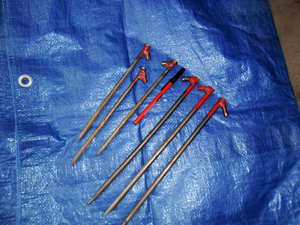 We used 2 batteries & jumper cables to weld some of the tabs.
We used 2 batteries & jumper cables to weld some of the tabs.
|
If youíre handy with a welder, you can fashion your own heavy duty tent stakes. My long ones are pieces of 3/8" steel rod 12Ē long with a tab welded on the end.
My short ones are 5/16" recycled 9" nail type stakes that originally came with a green plastic tab. The plastic tab lasted for about 2 trips.
These work great in any type of ground, and will last for years. That tab makes it easy to pry up the stakes, too. This is about the size of rod most muffler shops use to fashion muffler hangers.
Maybe you can get them to sell you a few lengths. Another advantage of metal stakes - you can always sacrifice one or two to make a vehicle trail repair!
Most any smooth steel rod will work. I don't care for rebar for tent stakes. While they hold like nothing else, the ridges make it very difficult to pull up the stake.
A 3/8" round stake will feed through the grommet on most tarps too. They may be slightly too large for the holes in the foot of an easy up - something you should check if you own an easy up.
|
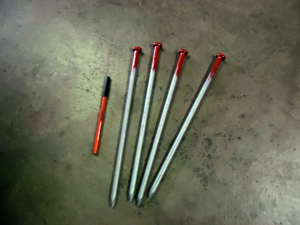 Home Depot 12" Spike - someday I will weld on tabs.
Home Depot 12" Spike - someday I will weld on tabs.
|
Visit Home Depot for a quick and inexpensive stake. They sell 3/8" by 10" and 12" galvanized spikes for about 70 cents each. A short tab welded near the top will make them even better.
Be sure to grind off the galvanizing where you plan to weld.
Can you get by with plastic tent stakes? Sure. The thicker ones hold well in dirt and are fine for summer camping.
Their T shape allows for easy extraction, and the bright yellow color really stands out. If you have them, bring them along as "deep" backup!
When to use long or heavy duty tent stakes
As I mentioned, I highly recommend replacing original tent stakes with heavy duty ones. There are certain conditions which call for long and/or heavy duty stakes.
These include:
- High winds: Don't depend on the weight of your gear to hold you tent down. A high wind can move you, your gear, and your tent a long way.
- Hard ground: Will defeat wimpy stakes.
- Soft ground: Particularly if youíre tenting on sand, youíll need long tent stakes. I recommend at least 12Ē in length.
Carry at least 4 of the 12" stakes for sand and to guy out the tent in very heavy winds.
- Frozen ground:
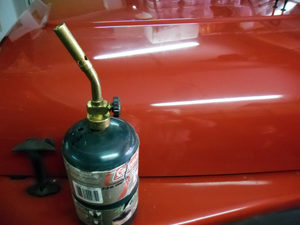 You carry an attachment for your propane. Don't you?
You carry an attachment for your propane. Don't you?
|
The big issue here is getting the stakes out afterward. The tent stakes may pound in easily enough. But if the ground freezes during your trip,
the stake will be difficult to remove.
You can use a torch to heat up steel tent stakes, especially heavy duty stakes. The key here is to use a small rope to attach the stake to the loops on the tent. Then you can untie the tent and remove it to avoid setting it on fire.
Also, use another stake to dig out some of the dirt underneath, then to pry up on the tent stake.
A couple other conditions to watch for:
- Tripping on tent stakes: First, make sure the tent stakes are pounded into the ground. The only thing sticking up should be the part needed to pull up the stake.
Paint the tops of your tent stakes a bright color (mine are red). This also makes them easier to find if misplaced in the dirt/ sand.
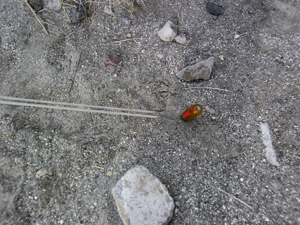 Use a screwdriver as a make shift stake. So far, no damage to the screwdriver.
Use a screwdriver as a make shift stake. So far, no damage to the screwdriver.
|
- Not enough/no stakes (wimpy ones did not work):
Screwdrivers work pretty well. I can always come up with an extra 4 or 5 screwdrivers out of my tool box.
- Camping on a slick rock slab: You can use rocks! You cannot pound in tent stakes, so youíre forced to use rocks. Make sure you tie the cord around the rock.
Donít just set the rock on the cord. That wonít hold, regardless of how heavy the rock is. Find big rocks you can carry without hurting yourself.
Use one each to tie down the tent cord. Place one more between that rock and the tent to keep the anchoring rock in place. (It acts like a door stop.)
Use extras to hold down the edges of the tent, the rain fly, and the corners of the tarp.
Removing tent stakes
What goes in must come out, as they say. One common frustration with campers is the difficulty of pulling out tent stakes.
You can buy a tent stake puller. I have yet to find one that really seems worth carrying. They are either the size of my Hi-lift Jack (which would work if it was that bad)
or they are as wimpy as the stakes they are designed to pull out.
Use another tent stake or similar tool to dig around the tent stake then pry it up. If you have a mini pry bar, try that.
Twist the stake; just a quarter turn will often get it to release.
Another possibility involves tying a piece of rope or chord around the stake just under the top. Depending on conditions, you might be able to pull up the tent stake.
(Though you might have to loosen it first.) You may find it easier to tie the rope in loop, so you can pull up easier with two hands
(A 6 foot cord tied in a loop gives the best results because it allows you to stand up and use your legs not your back).
Resist the temptation to use the loop or rope sewn into the tent to pull up the stakes. If they break you have no way to set the tent up until they are repaired.
Donít let your campout blow away Ė literally Ė due to poor staking. Buy or make heavy duty tent stakes, and youíll rest easier.
For related reading, see Use a Checklist For Every Outing, Tomís Tips for Tranquil Tenting, and Camp Box Tips.
# # # #
|
|
##########################
Related Articles from Badlands Off-road Adventures
|
Did you miss the previous articles?
|
##########################
Free (well almost) Annual Membership in Tread Lightly!
Drive Offroad is a huge source of aftermarket parts for 4 wheel drive vehicles that you might never have heard about. Check out their internet site
driveoffroad.com and order a free catalog.
When you place an order for $250 or more with Drive Offroad and enter promo code tread-lightly during the checkout process, they will send $25 to Tread Lightly!.
You will become a member, if you are not already one. If you are a Tread Lightly! member, your membership will be extended by one year.
If you are already a lifetime member, they will donate $25 to Tread Lightly! in your name.
This deal will last throughout 2012.
Here is the link to the page that describes the deal.
|
##########################
Major Events Planned for 2012
Badlands Off-Road adventures, Inc. still has 2 significant events on the schedule for this year.
If you wish to participate, you need to start making plans soon. Some events have early due dates, may require significant preparations, have limited positions and
require time off from work.
- Wilderness Advanced First aid June 28- July 1 (WAFA)
- Rubicon Trail a week in August
See details below.
|
##########################
Wilderness Advanced First Aid Course June 28, 29, 30 & July 1, 2012
It is time to sign up. We have a minimum required for the class.
The Wilderness Advanced First Aid clinic will provide you with skills, knowledge and training to handle life threatening medical emergencies
and allows you to be better prepared to protect your family in an emergency.
Wilderness Advanced First Aid is a four day immersion into general medical concepts and Basic Life Support skills.
This course teaches what to do with a medical emergency when help is miles away and calling 911 isnít an option.
If you plan to become a Wilderness First Responder, this is the first 4 days of the 8 day Wilderness First Response course.
You can take the second 4 days at a later time (within 3 years).
"
The Wilderness First Aid was one of the MOST USEFULL clinics I have ever attended, due in large part to the effort you and Josh put in to make it all possible.
"
Joe de Kehoe
Note - this is a four day class and you must be at least 18 years old.
If you are interested follow these links.
More Details...
You can register directly at
http://www.4x4training.com/calendar/calendar.php#WFA
|
##########################
This one day clinic starts with the basics.
If you are considering installing a powered winch on your vehicle, or have one already but need training to learn how to get the best from it and do it safely,
you need to take this class. The one day course covers: safety related issues, basic operation of the winch, simple and complex riggings, stuck assessment,
winch capability, and minimizing environmental impact. This is a hands on class.
By the end of the day you will be safely rigging some complex recoveries.
More Details...
You can register directly at
http://www.4x4training.com/calendar/calendar.php#Winch
|
##########################
Getting Started Off-road Driving Clinic May 19, 2012
The clinic is held in Hungry Valley State Vehicle Recreation Area near Gorman CA.
This clinic is specifically designed to meet the needs of novice off-highway drivers or someone with a bit of experience who is looking for a more complete understanding.
This is a one-day session. The session includes classroom and behind-the-wheel instruction.
More Details...
You can register directly
here
|
##########################
Advanced Beginner Clinic May 20, 2012
The clinic is held in the El Paso Mountains near Mojave CA.
The goal is to help you get a "better feel" for tire placement and to visualize the obstacles as they move into your blind zone.
You will gain more behind the wheel experience combined with picking lines.
The difficulty level is one step higher than the basic class and you can expect some pin striping.
More Details...
You can register directly at
http://www.4x4training.com/calendar/calendar.php#Basic2
|
##########################
The Badlands Off-road Adventures Store
Click here if you cannot see the full store
|
|
##########################
I hope to see you on the trails!
Tom Severin, President
Badlands Off Road Adventures, Inc.
4-Wheel Drive School
310-374-8047
http://www.4x4training.com
Make it Fun. Keep it Safe.
#####
If you find this information valuable, please pass it on to a friend. You can forward them the email.
If you received a forwarded copy of this newsletter and would like to subscribe for yourself, go to:
www.4x4training.com/contacts.html
and follow the instructions to join our mail list.
Want To Use This Article In Your Magazine, E-Zine, Club Newsletter Or Web Site?
You are welcome to use it anytime, just be sure to include the following author/copyright information:
Tom Severin, 4x4 Coach, teaches 4WD owners how to confidently and safely use their vehicles to the fullest extent in difficult
terrain and adverse driving conditions.
Visit www.4x4training.com to develop or improve your driving skill.
Copyright 2012, Badlands Off-Road Adventures, Inc.
|
|
| | |